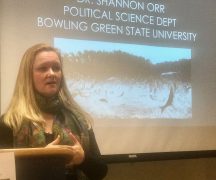By DAVID DUPONT
BG Independent News
The Trump Administration antipathy toward the Environmental Protection Agency has scientists at Bowling Green State University worried.
Of particular concern to the region is how changes at the EPA could affect efforts to protect and restore the Great Lakes.
Trump views environmental protection regulations as a hindrance to economic growth and has appointed Oklahoma Attorney General Scott Pruitt, who has sued the EPA on numerous occasions, to head the agency.
“There’s a lot of uncertainty and a lot of worry,” said George Bullerjahn, a professor of research excellence in biological science.
Bullerjahn has been heavily involved in studying the cyanotoxins in Lake Erie that closed down the Toledo water supply in 2014.
He and colleague Robert Michael McKay worked with Republican U.S. Rep. Bob Latta’s staff to draft the Drinking Water Protection Act.
The legislation was the rare law that made it through a Congress deeply divided along partisan lines.
Bullerjahn said that he felt that Latta was “swimming upstream” in backing the legislation when many of those in the conservative legislator’s fellow Republicans wanted to see the EPA abolished.
Much of his funding comes from the National Oceanic and Atmospheric Administration and the National Science Foundation. Sientists there are also nervous. But, Bullerjahn said, “EPA is the whipping boy.”
McKay shares Bullerjahn’s concern. “Our new administration is very unpredictable.”
That was evident when just after the Inauguration the administration ordered a freeze on all grants and contracts. The Washington Post reports that has been lifted, but uncertainty remains on other fronts.
In an email, McKay wrote: “Also unclear how the actions of the administration will impact the Great Lakes Restoration Initiative which is administered by EPA. Notably, in December, Congress authorized $300 million to carry through 2021 and apparently language in the Bill directs those funds to be spent on the Great Lakes, so perhaps that offers some protections. However, there are other activities/initiatives directed by federal EPA that could impact our ability to monitor the health of the lakes.
“Potentially affecting BGSU scientists would be modifications to the seasonal monitoring surveys conducted by EPA (to be clear, I have not heard on any negative actions that would affect this program – yet). “Each spring and summer, a research vessel contracted by EPA conducts water quality monitoring surveys through each of the Great Lakes. These data are invaluable to scientists – but unfortunately could be something targeted by the new administration for elimination.”
Through contact on list servers, geologist Jim Evans has gotten a peek into the mood at EPA.
One senior scientist reported: “The entire agency is under lockdown, the website, Facebook, Twitter, you name it is static and can’t be updated. All reports, findings, permits and studies are frozen and not to be released. No presentations or meetings with outside groups are to be scheduled.”
The scientist continued: “We are still doing our work, writing reports, doing cancer modeling for pesticides hoping that this is temporary and we will be able to serve the public soon. But many of us are worried about an ideologically-fueled purging and if you use any federal data I advise you gather what you can now.”
Evans said he was also concerned about Trump’s stated policy that for every new regulation proposed two more would have to be eliminated. Evans said he questions whether Trump understands the process a regulation must go through to get enacted.
“To promulgate a rule or regulation involves an elaborate process that requires making public a preliminary or draft rule or regulation, getting public comment and holding hearings about it, revising the draft rule or regulation in response to public comments and writing a final rule or regulation, again getting public comments and holding hearings, then undergoing a final approval process before publicly announcing an ROD (record-of-decision) bringing the rule or regulation into effect.”
Many regulations also require working with other agencies
“To rescind a rule or regulation, you have to do the exact same thing all over again (all the steps),” Evans wrote. “Every step in this process could bring legal action and years of arbitration.”
Biochemist Bob Midden stipulated his comments were “as a private citizen and scientist.” The comments, he wrote are “not intended to represent any position or policy of BGSU.”
He is concerned about any restriction placed on scientists and how they communicate with the scientific communities beyond the walls of the EPA.
“Restricting communication by EPA scientists could be very detrimental to efforts to study and restore Lake Erie and not only that but also many other efforts to address environmental problems,” he wrote.
“Practice of science is free and open communication,” he wrote. “Scientists are required to share their data, reasoning, and conclusions with all other scientists to allow for peers to critically review and evaluate that. This is an essential aspect of the scientific enterprise that helps to ensure that science advances in the most reliable and accurate way. It doesn’t mean that mistakes are never made but it allows for eventual correction of those mistakes.
“Suppressing scientific communication would be very distressing and might be considered a tactic of a police state or despotic ruler and would certainly not be characteristic of a free society that values and even treasures free speech and the use of science to promote the common good.”
Midden said while government agencies do have reasons for controlling information, those agencies should only hire reputable and qualified scientists “and those individuals should be completely free to communicate their scientific data, findings, and thoughts. Attempts to suppress that would suggest a desire to deceive or mislead.”
Meanwhile, Bullerjahn said he’s schedule to go to Washington D.C. at the end of March. He sits on a panel that will review more than 100 grant proposals. When the freeze on grants and contracts was announced, he called the EPA to see if the panel would still meet. He was told it would.
The review process will go forward, but Bullerjahn questions what will happen beyond that. “What I’m guessing is I’ll be reviewing a lot of grant proposals that won’t get funded.”





